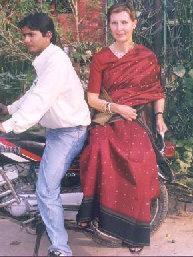Vroom! Pintoo kick starts his bike. His pillion - Dr. Maren
Bellwinkel-Schempp, a sociologist from Heidelberg University, Germany. What is
she doing biking around in the city? She first came here in 1972,
attracted to "the foremost industrial city", to study labour
migration for her Ph.D. She lived in Kanpur for two years, staying with
Col. P.K. and Dr. Lakshmi Sahgal. Their daughter Subhashini was Maren`s
age, and an upcoming labour leader, so there was a natural bond.
Dr. Maren has vivid memories of going around the labour colonies on her
red cycle. In those days Lalimli, Muir Mill and Elgin Mills were all
working three shifts. If one slept out at night one woke up in the
morning with a covering of fine coal dust. Today, sadly Kanpur has only
dust, for the looms have fallen silent. Those same mill workers are now
reduced to selling vegetables. In the course of her studies, Dr. Maren
discovered that most of the millworkers were Dalits from Eastern U.P..
The reason, because whenever the thread broke, the worker licked it to
join it. Hence no upper caste was prepared to work in the same
department.
From the study of migrant labour, Dr. Maren`s focus gradually shifted to
Dalit issues. She kept coming to Kanpur with a research grant from the
South Asia Institute of Heidelberg University. She felt happy that
International Women`s day was celebrated with such fervour in Kanpur. It
is not so in Germany. Women`s movements in the West were mostly of the
"middle classes", and not of the proletariat. She finds Indian
upper class women very strong. "They can ruthlessly shout their
husbands down"! There is more of gender equality among the Balmiki
where men play an equal role in child rearing.
Living in Kanpur has not been easy, with it`s appalling civic conditions,
power cuts and chaotic traffic. Most people do not know how to relate to
foreigners and tend to be very brusque in their repartee. Despite
donning the traditional Indian attire and speaking chaste Hindi, she
found that men in Kanpur just did not know how to behave with women.
When Maren first came to the city in the 1970`s, people were openly
hostile to foreigners. With the passage of time, things have changed
along with the attitudes and she finds herself quite at home in Kanpur.
She keeps coming back because she feels that she really loves the people
she is working with.
|
